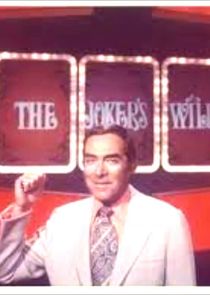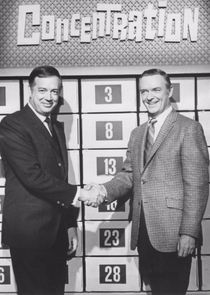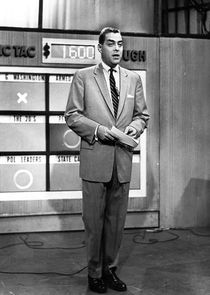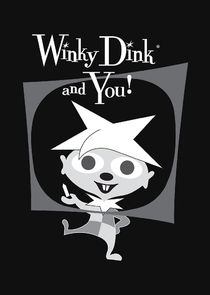Jack Barry born (John Barasch) was an American television personality and executive who made a name for himself in thegame show field. Barry served as host of several game shows in his career, many of which he developed along with Dan Enright as part of their joint operation Barry & Enright Productions. Barry's reputation became tarnished due to his involvement in the quiz show scandals of the 1950's and the ensuing fallout affected his career for over a decade. Barry was born and raised in Lindenhurst, New York, graduating from Lindenhurst High School. He graduated from the University of Pennsylvania's Wharton School of Finance and Commerce, inPhiladelphia. In the 1940s he began on radio, where he met his eventual business partner Dan Enright. Once television broadcasting began, Barry and Enright got involved in local programming, and eventually national programs, thanks in part to the success of early Jack Barry hits such as the children's show Winky Dink and You, reputedly the world's first-ever interactive television program. Barry and Enright also produced Juvenile Jury, Life Begins at Eighty, and Wisdom of the Ages. In the 1950s, Barry and Enright got involved in game shows, with Barry hosting The Big Surprise. He was eventually dismissed from his hosting duties and was replaced by Mike Wallace, persuading Barry to begin packaging game shows by himself.
In 1956, Barry and Enright launched Twenty One (sponsored by Geritol) and Tic-Tac-Dough. Both quiz shows were hosted by Barry. In a 1992 PBS documentary, Barry's partner, Dan Enright, said that after the first unrigged broadcast of Twenty-One, sponsor Geritol complained to Barry and Enright the following day about the dullness of that episode (the two contestants repeatedly missed questions). According to Enright, "from that moment on, we decided to rig Twenty-One." The show was then meticulously choreographed, right down to how contestants comported themselves on the air, making them full, if not always willing, partners in the deception. In 1958, a match between challenger Charles Van Doren and champion Herb Stempel was found to have been rigged, with Van Doren's victory having been pre-determined by the producers. (The 1994 movie Quiz Show was based on the Stempel-Van Doren contests.) Within three months of the published revelation, Twenty-One was cancelled. Dough Re Mi and 3 other shows were taken over by NBC. Another Barry-Enright production, Tic-Tac-Dough, was cancelled as well. Barry next hosted the nighttime version of a new show Barry and Enright created with Robert Noah and Buddy Piper, Concentration. With the quiz show scandal heating up, Barry left Concentration after four weeks. Barry and Enright were forced to sell all rights of their shows to NBC. Though Enright and producer Albert Freedman actually carried out the rigging of Twenty-One, Barry admitted in the 1970's and 1980's his role in covering up for the partners. However, Barry himself was apparently not averse to "juicing" a show, even after the Twenty-One and Tic-Tac-Dough debacles left his career in eclipse. A veteran quiz producer once said that in the 1960s, when Barry was working on a pilot of a Mark Goodson-Bill Todman production featuring "spontaneous" filmed responses, Barry fed his respondents scripted lines to make them funnier, though it should be noted that most all game show television pilots contain scripted elements for the purpose of helping to "sell" the game to the network.
Enright found television work in Canada with Columbia-Screen Gems, while Barry went toCalifornia. The two collaborated on small Canadian-produced quiz shows including Line 'em Up andPhoto Finish, shot in Montreal, and It's a Match and The Little People, taped in Toronto. It was on these shows that a number of young American and Canadian producers and directors got their start, including Mark Phillips and Sidney M. Cohen. "Slowly," said a 1984 article in TV Guide which discussed game show hosts, "he began to receive calls: Would he fill in for five weeks on this game show? Yes. Of course." Barry appeared on a few local game shows in Los Angeles during this time (mostly on KTLA), which included a local version of You Don't Say!, which was later hosted nationally by Tom Kennedy. Barry even dabbled in acting, playing a newsman on the premiere of the mid-1960's TV series Batman. He also did a guest reporter spot on the TV series The Addams Family. Finally, in 1969 he became a host again, for ABC's The Generation Gap, replacing original hostDennis Wholey for the final weeks of its series.
Later in that year, Barry embarked on an idea which would launch his national comeback, and eventually become the most successful game show project of his career. He developed and produced two pilots for The Joker's Wild in association with Goodson-Todman Productions, emceed by Allen Ludden. CBS held off on picking up the series at first. In 1970, Barry produced a pilot with a similar concept called The Honeymoon Game, hosted by Jim McKrell. After that failed to sell, Barry reworked the format and launched a local version of The Joker's Wild in 1971 on Los Angeles'KTLA, while early in that same year also selling The Reel Game to ABC. Barry also hosted this show, pitting three contestants in answering questions centered around vintage newsreel footage, for cash prizes, and the chance for a new car (which no contestants won during the run). The series ran weekly in prime-time for 13 weeks.
The Joker's Wild made its national debut on CBS in 1972 (debuting on the same day as The Price Is Right) with Barry hosting and packaging the show (under the Jack Barry Productions name) until CBS cancelled it in 1975. Jack Barry Productions, meanwhile, also packaged Hollywood's Talking,Geoff Edwards' first game show, and Blank Check, hosted by veteran quiz and game host and announcer Art James. Even before Joker, however, Barry had displayed no loss of concurrent hosting and production skill, doing both with The Reel Game and a 1970s revival of Juvenile Jury. Barry even brought Dan Enright back as The Joker's Wild's executive producer toward the end of its first network run, mentioning Enright at the end of the final CBS installment. The two renewed their working partnership full-time in 1976, launching Break the Bank, hosted by Tom Kennedy, on ABC's daytime lineup. (When ABC cancelled the show despite decent ratings, Barry himself hosted and produced the show for weekly syndication during the 1976-77 season.) In the fall of 1976, Barry sold reruns of The Joker's Wild's final CBS season to several stations, including New York's WOR-TV and Los Angeles' KTLA. These reruns rated highly enough that Barry and Enright chose to bring the game back into production for first-run syndication beginning in 1977, with Barry again the host. The show was distributed by Dick Colbert Television Sales and produced at the Chris Craft Studios of KCOP-TV in Hollywood. The series was seen in Los Angeles on KHJ-TV, despite being produced at KCOP, and despite the test run of the final CBS season having aired on KTLA the season before. Joker eventually did air on its flagship, KCOP, for two seasons, before moving back to KHJ for the final three seasons.
The new, syndicated Joker was a huge success, enough that it enabled Barry to reach back to his days as a children's program creator and host, launching in 1979 Joker! Joker!! Joker!!!, a weekly kids' version of The Joker's Wild in which children could win savings bonds (their family members assisted them in playing the bonus rounds). The new Joker was so successful that Barry and Enright gambled on reviving a show whose reputation had been somewhat damaged by the ancient quiz show scandal. Tic-Tac-Dough, with new host Wink Martindale, first had an unsuccessful eight-week run on CBS' daytime schedule in 1978. The syndicated run of the show (debuting in the fall of 1978) became successful and ran for eight years with Martindale and in its final year, with Jim Caldwell as host. From there, Barry & Enright in the 1970's and early 1980's developed and produced games like Bullseye, Play the Percentages, Hot Potato, and Hollywood Connection. They also produced several unsold pilots such as Decisions, Decisions. They even developed a resurrected Twenty-One in 1982, though this version never saw air. In due course, Barry & Enright Productions moved to film and series television production work.
In his final years, Barry renewed ties with NBC and began developing game show projects, including Hot Potato, which proved to be his last that made it to television. He also made an attempt to sell The Joker's Wild and Tic Tac Dough to NBC affiliates in an attempt to remove a winnings limit of $50,000 imposed due to the amount of CBS affiliates (in compliance with a network rule) airing both series, as NBC imposed no such winnings limit on its or its affiliates' programming. That limit was eventually removed shortly before Barry's death.






